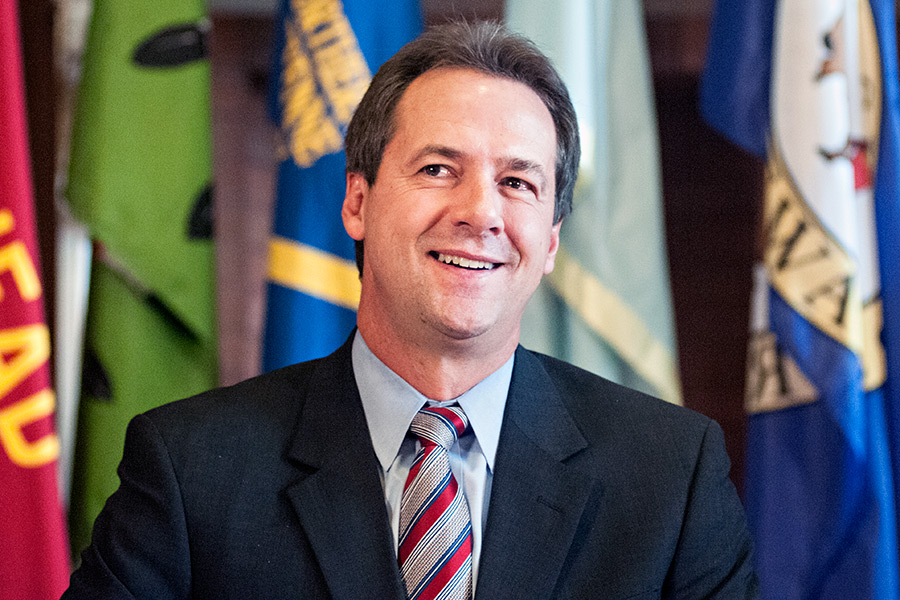Bullock Wins Second Term as GOP Dominates Other Races
Bullock's win was a rare bright spot for Democrats after a strong Election Day for Republicans
By MATT VOLZ & MATTHEW BROWN, Associated Press
HELENA – Montana Gov. Steve Bullock won a second term and secured the Democrats’ 12-year hold on the governor’s office for another four years by defeating Republican challenger Greg Gianforte.
Bullock’s win was a rare bright spot for Democrats after a strong Election Day for Republican candidates in Montana. Incumbent Ryan Zinke held on to the state’s only U.S. House seat, while the GOP took two statewide offices — secretary of state and state auditor — from the Democrats, and were poised to flip a third, superintendent of public instruction.
Republican Attorney General Tim Fox, the fifth statewide officeholder, easily won re-election against former Democratic legislator Larry Jent.
Republicans also appeared likely to hold their majorities in the state House and Senate.
Bullock’s win came Wednesday morning after a long night of returns that often showed the two candidates neck-and-neck. He remains in the rare position of being a Democrat leading a conservative-learning, energy producing state.
His victory also keeps alive Montana’s streak of electing Democratic governors while picking the GOP presidential candidate since the 2004 elections. Donald Trump easily won Montana’s three electoral votes on his way to defeating Hillary Clinton.
Voters decided to stick with Bullock after an expensive and bruising campaign in which the candidates’ visions for the state’s future were often overshadowed by personal attacks and insults against each other. Bullock, speaking to supporters in Helena, called on leaders to rise above an election marked by toxicity, fear, incivility and personal destruction.
“I’m optimistic that our leaders, Democrats and Republicans, can still rise above that toxicity to demonstrate to those we represent that we’re individually and collectively better than all this,” Bullock said.
Gianforte released a statement congratulating Bullock and the Republican statewide office winners.
“I knew taking on an incumbent would be a challenge, but I decided to run for office because I believe in the potential of Montana and in all Montanans,” he said. “Nothing has changed that for me.”
Bullock, the state’s attorney general before being elected in 2012, framed himself as a coalition builder and a champion of protecting public access to lands and waterways. Gianforte, a conservative software entrepreneur who was making his first run for office, hoped to unseat Bullock by promising voters to bring high-paying jobs and cutting taxes.
But as the race grew tighter, the attacks from each side sharpened.
Bullock repeatedly said Gianforte donating his campaign an unprecedented $5 million of his own money is evidence that the Bozeman businessman is trying to buy the election. Gianforte accused Bullock of mismanaging the state budget and misusing its resources.
One issue that’s dogged Bullock is the failure to pass legislation to pay for infrastructure improvements in eastern Montana, which has groaned under the weight of growth spurred by the Bakken oil boom in North Dakota.
Perhaps as a result, most voters in eastern Montana threw their support behind Gianforte, while Bullock’s support came mainly from the state’s large cities in western Montana.
Bullock previously said that upon re-election, passing an infrastructure bill would be one of his top priorities early in the 2017 session, which gets underway in January.
In the U.S. House election, Rep. Ryan Zinke prevailed in a race fueled by millions of dollars from out-of-state donors and political committees, helping make it the most expensive House election in Montana’s recent history.
Zinke defeated the outgoing superintendent of public instruction, Democrat Denise Juneau. Zinke said he would represent all Montanans upon his return to Congress, and vowed to use his military experience to “evaluate things based on their merits and not their political origin.”
“Certainly as (Montana’s) lone congressman I have an important role to play to articulate Montana’s value and what’s important in states that are further away from Washington, D.C.,” he said. “We’re only going to solve our problem by working together.”
After previously expressing interest in serving in the cabinet of a Donald Trump administration, Zinke did not explicitly reject that possibility Tuesday night. But he said that for now he was happy to be a congressman.
His victory maintained a Republican lock on the state’s sole House seat that dates to 1997, when Democrat Pat Williams left office.
In the statewide races, former Republican lawmaker Corey Stapleton of Billings defeated outgoing Democratic state auditor Monica Lindeen to win the open secretary of state seat.
Jesse Laslovich, Lindeen’s chief legal counsel, had hoped to replace his boss as auditor but was defeated by Republican state Sen. Matt Rosendale.
Republican state Sen. Elsie Arntzen was leading Democrat Melissa Romano, a teacher who was making her first run for office, to become the next superintendent of public instruction.
In the nonpartisan state Supreme Court race, District Judge Dirk Sandefur defeated University of Montana adjunct law professor Kristen Juras.